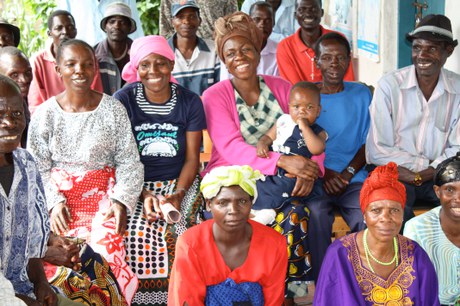
World AIDS Day in Basel – Fighting the Stigma
Even now, in 2015, being diagnosed with HIV brings a stigma for those who are affected and there is a great fear of discrimination. That it does not always have to be this way is demonstrated in a film from Tanzania premiering in Basel on World AIDS Day on 1 December 2015: “JUST LIKE YOU – WIE DU UND ICH”. The film portrays an HIV-positive female pastor who, together with a large self-help group, has successfully broken her society’s silence concerning HIV/AIDS.
An extraordinary life story
When meeting Melania Mrema Kyando for the first time, many people are surprised by her openness: “Good afternoon! I’m Pastor Melania and I’m HIV positive.” This, or something similar, is how she usually introduces herself. Although at least 1.5 million people are infected in her native Tanzania, only a very few talk as openly and publicly about their status as she does.
Who is this Tanzanian woman? She was born in northern Tanzania in 1962 as one of nine children. She was already in her mid-thirties and a pastor when she got married. Her husband was a widower who brought five children into the marriage. Two years after their wedding, he fell ill: he was often feverish; he then contracted typhus and eventually tuberculosis. When he died, Melania plucked up all her courage and asked the doctor the cause of his death. His unsparing reply: AIDS. She was stunned. She knew that her husband had probably infected her as well. It was not long before she became weak. Typhus, eczema, collapse of the immune system, tuberculosis. Months in bed. She had herself tested: HIV positive. This was a time when HIV/AIDS was still a big taboo. Sufferers were ostracised. Melania felt isolated and became depressed.
By then, she held a leading position in the church looking after women, widows, children – but who was there for her to talk to? Nobody spoke about the disease from which so many people were suffering. Those affected were stigmatised, excluded. So Melania kept quiet, too, and as a result became weaker still. At the time, her husband’s five children were living in her house as well as three children from her brother, who had also died, along with four other girls she had taken in. Melania was seriously ill and could hardly work in the church office, never mind in the fields. Then, at a conference, she met a woman by chance who was afflicted by the same fate. But, unlike Melania, this woman was dealing with her illness much more openly. This encounter opened Melania’s eyes and saved her life. Melania, the HIV positive pastor, made a pact with God: if He kept her alive, she would not only be open about her infection, she would also educate the general public and call for the church to deal more openly with the disease. Melania survived – thanks to the medication she was now regularly taking, but also to her newfound will to live and her mission: to open the eyes of society and support the afflicted.
Live positive
For more than ten years, Melania has been living with HIV and has become a great ambassador campaigning against the marginalisation of those who are affected. Initially, her openness confused people. But now it is widely accepted. In the Mbeya region, which is roughly three times the size of Wales, almost everyone knows about this courageous pastor who fights stigmatisation with her openness. Alongside her work with women and children in the church, Melania visits the local hospital on a weekly basis and counsels patients who have just been diagnosed with HIV. She is a regular guest on a big radio station and answers listeners’ questions. People seeking advice form long queues outside the advisory offices she has opened at the weekly markets in her area.
Even in Tanzania, access to ART has become significantly better in recent years. When the HIV test turns out to be positive, all infected people are entitled to free medication. Thus, their medical-pharmaceutical care is ensured (if only at a low level). But what infected people are clearly lacking is qualified psychosocial support. Many are shunned by their families and experience a high degree of social discrimination. Melania Mrema Kyando has taken the initiative and brought together a group of infected people who meet on a regular basis: they call themselves “Lusubilo” – hope. Men and women, grandmothers and grandchildren, share their experiences and talk openly about their “positive” lives which are made possible by medication and openly dealing with the disease. Rather than behaving like pitiful victims, they are confident people who, in spite of their HIV positive status, embrace life. And they call on others to undergo the test in order to gain access to ART if they are infected.
Just Like You – Wie Du und Ich.
Nicholas Calvin Mwakatobe, a young filmmaker from Dar es Salaam, has closely followed Melania Mrema Kyando and the Lusubilo group over the past few years. The result is a film which impressively documents the everyday life of these people. The film’s title is an immediate, unequivocal statement against all forms of stigmatisation and social marginalisation: “JUST LIKE YOU – WIE DU UND ICH”.
The film is premiering on World AIDS Day on 1 December 2015 at 6.30pm in the Stadtkino Basel. Anyone interested is cordially invited to attend. Following the screening of the film (in English with subtitles in German), Carine Weiss of Medicus Mundi Schweiz/aidsfocus.ch will moderate a discussion with Pastor Melania Mrema Kyando and Nicholas Calvin in English (with translations in German). Afterwards, there will be an opportunity for further conversations over an aperitif.
Admission is free, but please register in advance at
info@mission-21.org.
More information can be found on the Mission 21 website.
Author: Johannes Klemm, Mission 21
